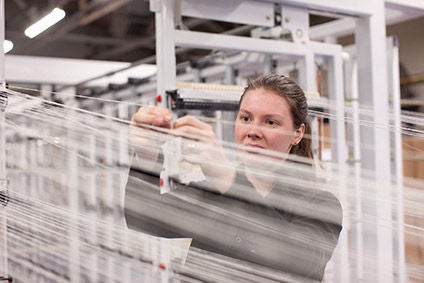
As the European Commission is poised to start developing a new ‘comprehensive strategy for textiles’ in the coming months, a group of 65 diverse civil society organisations has set out its vision for the global textile, garments, leather, and footwear (TGLF) sector.
A broad coalition of campaigners for fair trade, human and workers’ rights, environmental protection, and transparency, the group is calling on the European Commission, MEPs, and EU governments to back an ambitious strategy it says will “kick-start a global re-design of the textile industry’s broken business model for the post-coronavirus world.”
Consisting of organisations including Circular Economy, Clean Clothes Campaign, Fairtrade Foundation, Fashion Revolution, and Traidcraft Exchange, it has released a non-official strategy – ‘The Civil Society Shadow European Strategy for Sustainable Textile, Garments, Leather and Footwear’ – in which it proposes a set of legislative and non-legislative actions that the EU can undertake to contribute to fairer and more sustainable TGLF value chains.
The move comes after the Commission’s commitment to a “comprehensive textile strategy” in last month’s Circular Economy Action Plan. One of the main building blocks of the European Green Deal, the plan addresses some of the product groups with the largest environmental footprints, including textiles.
“The TGLF sector has long been characterised by labour rights and human rights abuses along with the immense pressure it exerts on our environment and climate,” the group says in a joint statement.
Muriel Treibich, lobby and advocacy coordinator for the Clean Clothes Campaign, adds: “It is time for EU leaders to step up and make the necessary regulatory reforms, as industry initiatives have clearly failed. The current health and economic crises has a devastating impact on workers in the supply chain and further brings to light the fragility and power imbalances of the sector.

US Tariffs are shifting - will you react or anticipate?
Don’t let policy changes catch you off guard. Stay proactive with real-time data and expert analysis.
By GlobalData“This shadow strategy will offer EU decision-makers a way forward on what to do to ensure that the textile sector’s development supports workers’ rights and livelihoods instead of actively undermining them.”
The joint initiative contains recommendations including:
- Ensure companies are legally obligated to take responsibility for not only their own activities but their whole supply chain by applying an EU due diligence law across all sectors, including specific requirements for the TGLF sector. Signing a multi-stakeholder partnership should not exempt business from responsibility.
- Stricter environmental rules that cover how textile products sold in the EU are designed and produced, legal and financial responsibility on producers for when their products become waste, as well as meaningful measures to promote transparency.
- Ensuring brands and retailers are legally obliged to honour contracts and end the culture of unfair purchasing practices that gives them impunity to cancel orders without honouring payments – leaving workers without pay and a wasteful pile up of unsellable products.
- Make governance reforms and better law enforcement in producing countries part of the solution to sustainability issues faced in the TGLF value chains.
- Through trade policy, use EU market power to leverage sustainable production practices in the TGLF industry.
The strategy has gained the support of members of the European Parliament Delara Burkhardt, Heidi Hautala, and Helmut Scholz who have addressed a joint letter to all members of the European Parliament to share and support the document.
In the letter, the MEPs stress “the textile sector has been among the most vulnerable to the Covid-19 crisis due to the power imbalances among its actors and its severe structural problems, including the environmental damage it causes and governance issues. It is one of the most polluting industries, the source of countless catastrophes like that of Rana Plaza, and a hotspot for human rights abuses – which affect women disproportionately.”
Representing the coalition, Sergi Corbalán, executive director of the Fair Trade Advocacy Office says: “Voluntary industry action has failed to bring about a fair and sustainable textile industry, so it’s time for EU leaders to reset the industry’s structure. This ‘shadow strategy’ offers the Commission the combined expertise of 65 civil society organisations who have years of experience in dealing with the various impacts of the sector.
“It’s not a menu from which the Commission can pick specific initiatives and leave others behind, but a comprehensive strategy in which taking action in each field reinforces the efforts put into others”.
It is understood EU environment ministers will share their views on the Circular Action Plan at the next Environment Council meeting on 22 June, with European Parliament due to discuss it at a forthcoming plenary session. The Commission is expected to publish a roadmap towards the Textile Strategy before the end of 2020.
Click here to read the strategy in full.




